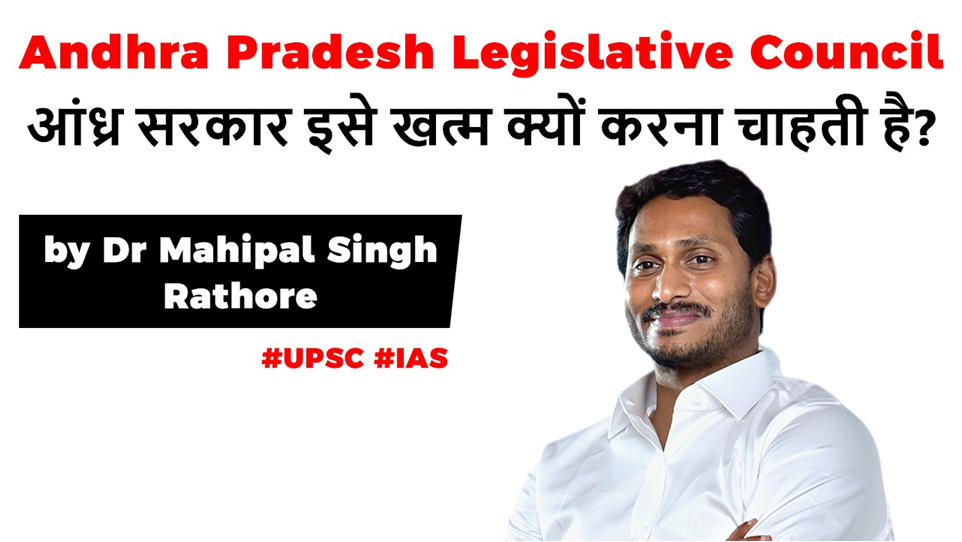Table of Contents

What is a Legislative council?
- A legislative council/Vidhan Parishad is the upper house of the state legislature in India.
- The members are indirectly elected + nominated.
- The LC is a permanent body and is not subject to dissolution.
- The purpose of the state legislative council is to ensure checks and balances on the elected assembly powers.
- Though often, councils are accused of creating executive logjam.
- A member of a legislative council is commonly referred to as an MLC.
Question ?
- How many members of the legislative council are elected by graduates residing within the state?
- 1/6th
- 1/12th
- 1/3rd
- 1/4th
- At present (January 2020), only six states have an upper house in the legislature .These are
- Andhra Pradesh
- Telangana
- Uttar Pradesh
- Bihar
- Maharashtra
- Karnataka
- The Legislative Council of Jammu and Kashmir was formally abolished on 16 October 2019
Can the Council be abolished ?
- Article 169(1) provides for the abolition or creation of legislative councils in states.
Who has the power to do so?
- The Parliament Sansad can abolish a legislative council (where it already exists) or create it (where it does not exist), if the legislative assembly of the concerned state passes a resolution to that effect.
The Resolution
- Such a specific resolution must be passed by the
- State assembly – by a special majority (majority of the total membership of the assembly and a majority of not less than 2/3rd of the members of the assembly present and voting).
- Parliament – passed like an ordinary legislation by simple majority.
- Note – It is not to be deemed as an amendment of the Constitution under Article 368 .
- Why does Andhra Pradesh Government want to abolish the upper house of the state legislature?

The 3 capital formula
- On January 20, the Andhra Pradesh cabinet cleared the proposal to create three state capitals—
- Amaravati (legislative)
- Kurnool (judicial)
- Visakhapatnam (executive)

- The same day, the state assembly passed legislation to that effect-
- The Andhra Pradesh Decentralisation and Inclusive Development of All Regions Bill, 2020
- The Andhra Pradesh Capital Region Development Authority Repeal Bill, 2020
- These legislations were sent to a select committee by the TDP led Legislative council , effectively delaying them

- Thus, the resolution was passed as the YSRCP government failed to get two crucial bills on its plans to have three capitals cleared by the opposition TDP-dominated upper house.
- On 27th January, 2020 , the Andhra Pradesh assembly passed a statutory resolution seeking to abolish the state legislative council.
- All 133 members present in the 175-member House, voted in favour.
How long can a council delay a bill?
- The ultimate power of passing an ordinary bill is vested in the assembly.
- At the most, the council can detain or delay the bill for a period of four months—
- 3 months in the first instance.
- 1 month in the second instance.
Have Vidhan Parishads been abolished earlier ?
- Andhra Pradesh got the legislative council created in 1957 and got the same abolished in 1985.
- It was again revived in 2007, after the enactment of the Andhra Pradesh Legislative Council Act, 2005.
- The legislative council of Tamil Nadu had been abolished in 1986
- Punjab and West Bengal abolished their councils in 1969.
Why are Legislative Councils needed?
- The AP assembly had just passed a bill creating an unprecedented three capitals for AP
- The council referred it to a select committee rather than doing government’s bidding to immediately pass the bill.
- Such a critical legislation severely impacting the state’s administration and finances merited elaborate scrutiny.
- Even brute majority decisions need their checks and balances.
- A legislative council, not held hostage by electoral imperatives, could even become a bulwark against today’s blatant populism .
Question
- How many members of the legislative council are elected by graduates residing within the state?
- 1/6th
- 1/12th
- 1/3rd
- 1/4th
- 1/12 members are elected by graduates of three years standing and residing within the state
Latest Burning Issues | Free PDF






















 WhatsApp
WhatsApp